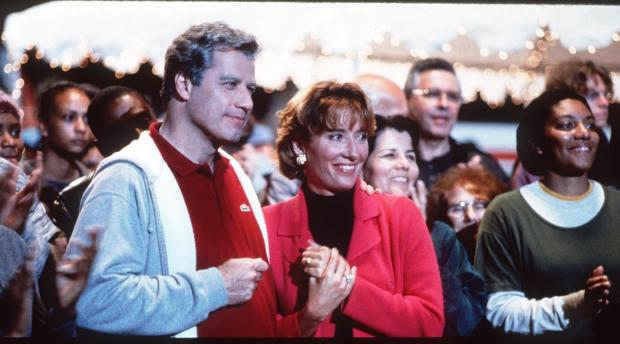An incumbent president steps down. A presidential hopeful gets shot. Cities writhe with protests opposing a bloody overseas war.
Oh, and did we mention a Democratic National Convention in Chicago? Let’s do the time warp again!
As uncannily alike as 1968 and 2024 have turned out to be so far, a reminder to breathe: the city has already broken the DNC curse once before, in 1996, when Bill Clinton was handily — and, all things considered, pretty uneventfully — nominated for reelection here. And this year could have been much crazier. The Dems set aside their squabbling just long enough to reject the pandemonium of an open convention and unify behind Vice President Kamala Harris. She’ll already be the nominee by the time she sets foot on the United Center stage this week: an Ohio law requiring that candidates be finalized 90 days before an election forced the Democratic Party to nominate Harris ahead of its own convention, scheduled after that cutoff. The year’s most anticipated political event? An empty formality, if a really expensive, schmoozy one.
Still, all over the city this week, invitations to celebrate our democracy — or grieve its fragility — abound. Many of the events and organizations below live out a favorite maxim of the late congressman and judge Abner Mikva: democracy is not a noun but a verb. It only works by doing.
Say your plans for the week involve more hunkering than doing. First, we can’t blame ya: Chicago expects a staggering 50,000 visitors to pour in for the convention. But it wouldn’t be an A+E list without a few Introvert Specials, from stuff to stream at home-sweet-home to watering holes in which to shelter from the throngs.
From the writers, editors and contributors of A+E, our picks for a DNC week that’s hopefully just the right amount of historic:
Roe-lling on the floor laughing
As the state of reproductive rights continues to erode across the country, “L’Abortion Variety Hour” arrives at exactly the right time. This feminist variety show will feature comedy, music and sketches aimed at addressing issues like misogyny, racism and homophobia while also galvanizing the city’s local and national guests during this critical cultural moment. “Bringing joy while fighting for abortion access reminds people that we can do good and have fun doing it,” said comedian and “Daily Show” co-creator Lizz Winstead by email.
Hosted by Winstead and local hero/DJ Jill Hopkins, the event will include performances by Jon Langford and Sally Timms of The Mekons, stand-up from Marcella Arguello and Rebecca O’Neal, musical acts by Bethany Thomas and Nora O’Connor, and burlesque by Dannie Diesel (the stage name of Danielle Colby from History Channel’s “American Pickers”). Proceeds benefit Winstead’s Abortion Access Front, an organization of comedians, activists, writers and others using humor for the stated aim of destigmatizing abortion. “The show and the evening surrounding it will give us all a chance to learn more about what we have at stake in this election, while providing some much-needed mirth to the start of an intense week here in Chicago,” Hopkins says.
8 p.m. Aug. 19 at The Metro, 3730 N. Clark St.; tickets $35 (18+); more information at metrochicago.com
— Britt Julious, freelance critic
Pulling back the star-spangled banner
An insider look at a presidential campaign, 1998’s “Primary Colors” adapts a roman à clef about Bill Clinton’s 1992 White House run, as told through the eyes of a campaign staffer. Mike Nichols directs a script by his old comedy partner Elaine May; the film is deeply and appropriately cynical about how campaigns function. John Travolta stars as the charming candidate, Emma Thompson as his teeth-gritting wife and Adrian Lester as the campaign worker who learns the hard lesson that, in politics, compromises abound. Kathy Bates is terrific as a no-nonsense fixer who will break your heart. Both May and Bates were Oscar-nominated for their work.
Available to rent and stream on Amazon and elsewhere.
— Nina Metz, Tribune TV and film critic
Soundtrack of a revolution
Singer Zeshan B’s 2020 album “Melismatic” brought his distinctive blend of soul, R&B and Indo-Pakistani music to wider attention. His anthemic follow-up, “O Say Can You See?,” came out last month, not a moment too soon for the DNC. (It was even executive produced by Preet Bharara, the podcasting legal pundit and former U.S. attorney for New York’s Southern District.) You’ll hear plenty of selections from “O Say” at “Democracy After Hours,” Zeshan B’s release celebration at the Hideout. Before that — and ticketed as a separate event — he joins Chicago journalists Aaron Cohen and James Porter for “Chicago Soul Legacies,” a conversation and crate-dig through Chicago soul music of the 1960s and ’70s.
“Chicago Soul Legacies: A Conversation & Performance,” 6 p.m. Aug. 20, tickets $15; “Democracy After Hours: Live with Zeshan B,” 10:30 p.m. Aug. 20, tickets $20. Both at the Hideout, 1354 W. Wabansia Ave.; box office and info at hideoutchicago.com
— Hannah Edgar, freelance critic
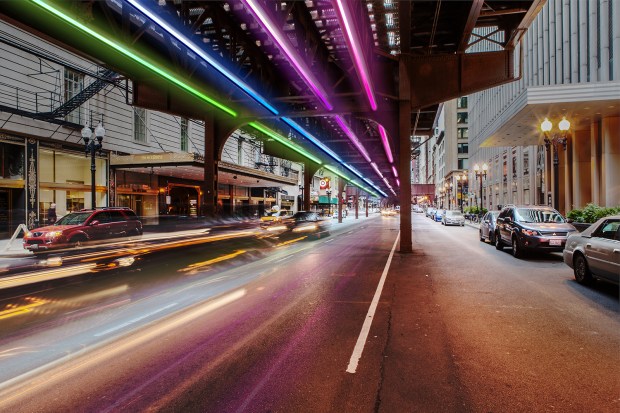
All off the “L”
The “Next Stop: Chicago” arts initiative — launching along west and south branches of the CTA Green Line during the DNC — has a straightforward political mission: to showcase how arts can be used to attract investment in disinvested communities. Local cultural agency Gertie rounded up about $400,000 in foundation funding and then doled it out to some very cool projects. Some of those projects: the Heart + Craft on Lake arts festival on Wednesday outside Garfield Park; the 50 feet of interactive “Blade Runner”-ish light art being installed beneath the Wabash Avenue CTA tracks between Madison and Monroe; an open-air “Black Abundance Dinner” in Englewood on Thursday to promote the neighborhood’s “We Deserve Beautiful Spaces” art project; a two-day party to celebrate the new “Arts Lawn” near Washington Park, complete with new outdoor furniture and soundscapes; and, through Aug. 24 at Bronzeville’s Blanc Gallery, “This Heavenly Body” by documentary-minded artist Seed Lynn, whose exhibition is both a tribute to and eulogy of skating-rink culture in Black communities.
Through Aug. 22 at various times and locations; more information at nextstopchicago.co
— Christopher Borrelli, Tribune features writer
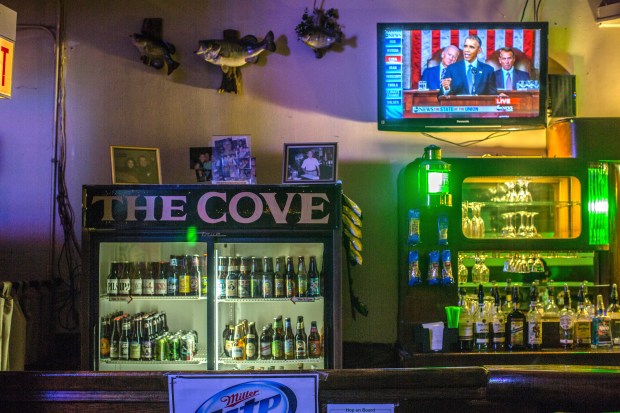
Yes, we can … go to the ATM
The Obama glow has faded somewhat ’round these parts. Barack and Michelle’s departure for the coasts and broken promises surrounding the forthcoming Obama Center, whose husk now hulks over Jackson Park like Sauron’s Tower, have soured many a local activist on the former president. But for a sip of the old optimism, consider wrapping your Green Line jaunt with a detour to The Cove (Christian name: the Cove Lounge), one of the Near South Side’s best dive bars and one of the most quintessentially Chicago nights out anywhere. Cheap beer sloshes as freely and stickily as the conversation, and outside food is allowed, if you’re fresh from a late-night takeout run. And, yes, a giant Obama grins from a hand-painted mural on the Cove’s eastern wall, framed by depictions of neighborhood and city attractions. The Cove is cash-only, so come stocked or risk eyerolls from regulars.
The Cove, 1750 E. 55th St., 11 a.m. to 1 a.m. daily, 773-684-1013
—Hannah Edgar, freelance critic
Laying down arms for an evening
It speaks to the state of bipartisan dialogue in this country that a nonprofit would make that once-low bar its raison d’être. Hence Braver Angels, “a volunteer-led group working to bridge the partisan divide” through creative programming, workshops, debates and more. On the second night of the convention, Braver Angels hosts “A New Day,” a concert and gathering at PianoForte — not far from McCormick Place — which welcomes “anyone along the political spectrum.” Violinist Sage Snider and singer-songwriters Ben Caron and John Carroll, all in the folk and Americana worlds, take the stage. Per an event spokesperson, “Reds, Blues, and Purples” have already registered.
7 p.m. to 9 p.m. at PianoForte Chicago, 1335 S. Michigan Ave.; free with RSVP; more information at pianofortechicago.com
—Hannah Edgar, freelance critic
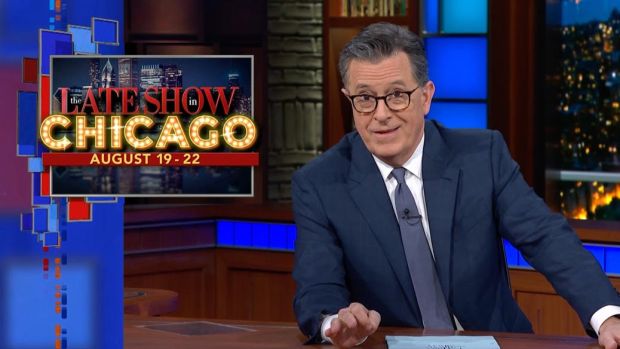
Late night, done local
Both “The Late Show with Stephen Colbert” and “The Daily Show” are broadcasting from Chicago during the Democratic National Convention. Colbert will tape his shows live from the Auditorium Theatre; “The Daily Show’s” “Indecision 2024” episodes will tape at the Athenaeum Center for Thought & Culture, with Jon Stewart joining as host on Thursday.
“The Late Show with Stephen Colbert,” broadcast at 10:35 p.m. Aug. 19-22 on CBS and streamed on Paramount+.
“The Daily Show,” broadcast at 10 p.m. Aug. 19-22 on Comedy Central and streamed on Paramount+ and other platforms.
— Doug George, A+E editor
An alt-convention
Admit it, as much as the city probably views protests during the Democratic National Convention as an inevitable headache, without activists in the streets raising awareness of a bottomless well of social problems, it wouldn’t be an American political convention. That’s democracy — or, as they’re saying in Bridgeport this week, “Democrazy,” what nonprofit Public Media Institute is calling its grab bag of activist talks and strategy sessions intended to direct your rage against the machine into something viable. (PMI is the group beyond the provocative long-running Chicago street zine Lumpen.) Held at Co-Prosperity in Bridgeport, Tuesday’s discussions hit a range of subjects: overpolicing, migrant assistance and lessons from the nationwide college encampments in the spring. Wednesday offers panels on the United States in Asia and prison abolition, and a concert performance of the 2018 musical “’68,” about what happened at that year’s DNC in Chicago. (Didn’t go well.) Thursday is a day of strategy sessions for activists by day and experimental theater work about AI at night.
Through Aug. 23 at Co-Prosperity Sphere, 3219-21 S. Morgan St.; free; for details, visit coprosperity.org
— Christopher Borrelli, Tribune features writer
Connivance at the convention
How many furtive, backroom strategy sessions lay the track for any presidential convention, real or fictional? In Gore Vidal’s 1960 Broadway play “The Best Man,” a principled but sexually indiscreet secretary of state squares off against a sneaky apparent moderate with a Big Secret in their bid for the nomination. The drama is very much of its moment, or dated, depending on your tolerance for Vidal’s eloquent, backstabby gossip. But the central ideas remain here and now. The 1964 film version — starring Henry Fonda, Cliff Robertson and, as the aging party standard-bearer, Lee Tracy — makes for an especially intriguing revisit right about now, even if the DNC’s 2024 2.0 ticket is no longer in flux.
Streaming on YouTube, Prime Video and other platforms.
— Michael Phillips, Tribune film critic
City Hall’s block party
All DNC, the city hosts “Celebrating Chicago at Daley Plaza,” a showcase of local performers and cuisine. The lineup includes a spotlight on street performers, with music sets by Cafe Rocker, Dovydas and the Red Star Ramblers (Aug. 19); a vintage sale, a First Nations event and music by Funkadesi (Aug. 20); youth performers including the South Shore Drill Team and Mariachi Aguilas de Benito Juarez (Aug. 21); a farmers market and DJs (Aug. 22); and “40 Years of House: A Celebration of Chicago Music” (Aug. 23). Food trucks will be on-site.
Aug. 19-23 in Daley Plaza, 50 W. Washington St.; full schedule and more information at Chicago.gov/DCASE
— Doug George, A+E editor
A stroll through conventions past
Chicago’s history of hosting presidential nominating conventions dates back to 1860, when the Republican Party nominated Abraham Lincoln — a pivotal moment on the eve of the Civil War. In the throes of another national crisis, the Great Depression, the Democratic Party held its 1932 convention in Chicago. Franklin D. Roosevelt broke precedent and accepted the party’s nomination in person, promising a New Deal for the country in his acceptance speech.
In total, 14 Republican National Conventions, 12 Democratic National Conventions (including 2024) and a dozen third-party conventions have been held in Chicago, making it the most popular city for such events. Paul Durica, director of exhibitions at the Chicago History Museum, explores seven historically significant precedents in “Convention City,” a walking tour following this year’s iteration.
“What people are going to experience is a walking tour that takes them through the Loop and connects to sites still existing there that are related to different conventions,” Durica says. “Key moments in the country’s political history happened right here in Chicago, and I just hope participants on the tour gain an appreciation of that.”
10 a.m. to noon Aug. 24, beginning at 191 N. Wacker Drive; tickets $25; more information at chicagohistory.org
— Emily McClanathan, freelance critic
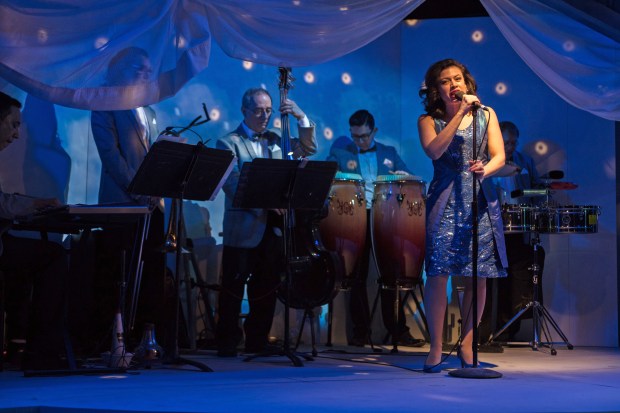
¡La Havana Madrid viva otra vez!
For a particularly joyous, particularly Chicago immigration story, Sandra Delgado’s “La Havana Madrid” is back for a free staged concert version of the play for one night only in Millennium Park. Presented by Collaboraction and Teatro Vista, the show directed by Cheryl Lynn Bruce debuted in 2017 in a small space at Steppenwolf, then moved onto the Goodman Theatre. It tells the history of the growing Puerto Rican community on the western side of Lincoln Park in the 1960s, particularly the popular Lakeview nightclub in the title. It does so with live music by Carpacho y Su Super Combo and Delgado herself.
6:30 p.m. to 9 p.m. Aug. 24 at Jay Pritzker Pavilion, 201 E. Randolph St.; free; more information at collaboraction.org
— Doug George, A+E editor
Mighty pens
It’s fair to say most independent bookstores make their politics obvious somewhere in their bricks-and-mortar. Reading itself can feel like a political act these days. But then there are those local indies that wear politics on their sleeves — which, in Chicago, feels like most indies.
Start with Andersonville institution Women & Children First, which, true to name, focuses mostly on books by women, with a sizable kids section; it’s run by “intersectional trans-inclusive feminists” and is often rumored to be the model of the bookstore in “Portlandia.” (Co-creator Fred Armisen spent formative years around here.) From there, try Unabridged in Lakeview, probably my favorite bookstore in the city, and certainly one of the oldest LGBTQ-minded bookstores in the country.
After that, head to one of two Semicolon locations, in River West or on Michigan Avenue. It’s a nonprofit focused on literacy, one of only two Black-owned bookstores in Chicago and a regular stop for Black authors.
Finally, go to 18th Street in Pilsen — home to Inga, which specializes in indie voices and very left-leaning self-published work, and Pilsen Community Books, the only employee-owned bookstore in the city and so committed to progressive politics that even the design on its cool totes was inspired by a WPA ad.
Women & Children First at 5233 N. Clark St., 11 a.m. to 6 p.m. Tuesdays-Sundays and noon to 6 p.m. Mondays; womenandchildrenfirst.com
Unabridged Bookstore at 3251 N. Broadway, 10 a.m. to 7 p.m. daily; unabridgedbookstore.com
Inga Bookshop at 1740 W. 18th St., 1 to 7 p.m. Fridays and Saturdays; i-n-g-a.com
Pilsen Community Books at 1102 W. 18th St., 11 a.m. to 7 p.m. Mondays-Fridays, 11 a.m. to 6 p.m. Saturdays and 11 a.m. to 5 p.m. Sundays; pilsencommunitybooks.com
Semicolon at 1355 E. Chicago Ave. (River West), noon to 6 p.m. Wednesdays-Saturdays and noon to 5 p.m. Sundays, and in the Wrigley Building, 400 N. Michigan Ave. (Loop), noon to 7 p.m. daily; semicolonchi.com
— Christopher Borrelli, Tribune features writer
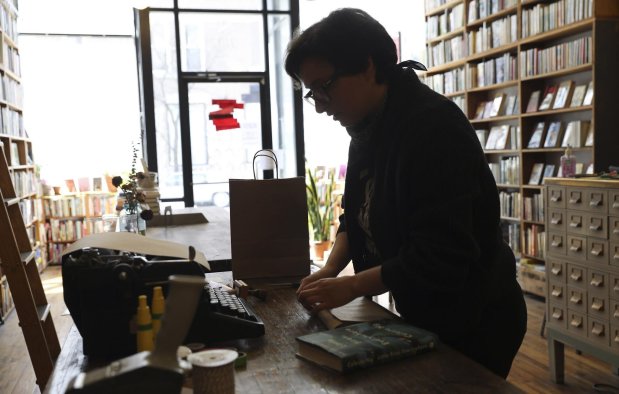
Baby backs and a premonition
A couple blocks from the former tavern at 403 W. North Ave. where 43rd Ward Ald. Mathias “Paddy” Bauler once spouted the line that will ever live in our political history — “Chicago ain’t ready for reform” — there is a lot of Sinatra on the jukebox at Twin Anchors.
There used to be a lot of Sinatra in the place. He came for the ribs during the 1960s and later would often have them sent to whatever city in which he was performing. There are those who will tell you that this cozy bar/restaurant is little changed since it opened in 1932. I couldn’t argue and I’ve been going here for almost 40 years. The ribs have stayed the same (actually I have no idea what else is on the menu, never having looked at one in all those decades), the service is still friendly and the place remains a classic neighborhood joint.
1655 N. Sedgwick Ave., open 4:30 to 10 p.m. Mondays-Fridays and noon to 10 p.m. Saturdays and Sundays.
— Rick Kogan, Tribune columnist
Drama-turned-documentary
When thousands of anti-war protestors came to Chicago for the now-infamous 1968 Democratic National Convention, filmmaker Haskell Wexler was there on the ground with his camera, shooting his narrative feature “Medium Cool” for Paramount. It stars Robert Forster as a glib local TV newsman who makes all kinds of questionable decisions, and the movie is consumed with questions about media ethics. Though fiction (mostly), a chunk near the end is shot like a documentary, with Wexler sending an actor — in character — out into the very real, very combustible goings-on in Grant Park and the downtown streets nearby. At one point, the police set off tear gas and Wexler and his crew are caught in the fray. Here is how Wexler’s methods are described in an essay about the movie commissioned by the Criterion Collection: “What if a riot doubled as a film set?”
If that sounds exploitative and opportunistic, the film doesn’t come across that way — to me, anyway. Maybe because Wexler’s sympathies are so obviously not aligned with the men wielding batons and cracking skulls. Wexler was a humanist, his work often focused on social justice.
Available to stream on Criterion.
— Nina Metz, Tribune TV and film critic
Signs of the times
The Chicago History Museum knew what it was doing when it put up “Designing for Change” earlier this year. Up through next May and open to visitors the last two days of the convention, the exhibition samples protest art — leaflets, pins and everything in between — created by city activists in the social justice ferment of the 1960s and ’70s. The parallels between our present moment and 1968 couldn’t be more obvious if you outlined them in red Sharpie.
Through May 4, 2025, at the Chicago History Museum, 1601 N. Clark St., open Tuesdays-Saturdays 9:30 a.m. to 4:30 p.m., Sunday noon to 5 p.m., closed Mondays and on Tuesday, Aug. 20 for a private event; $19 general admission, $17 students and seniors; ticketing and more at www.chicagohistory.org
— Hannah Edgar, freelance critic
Ad man vs. bad man
“No” is the best modern movie about politics and advertising you likely haven’t seen. Director Pablo Larrain’s terrific Chilean docudrama stars Gael Garcia Bernal, and comes hot off some tantalizing recent history. In 1988, Chilean military dictator Augusto Pinochet allowed a plebiscite in which ordinary citizens, many widowed or left without parents or children after Pinochet’s murderous “disappearance” of countless dissidents, voted for or against another eight-year Pinochet reign. Across a single month, pro-Pinochet and anti-Pinochet factions were allowed 15 minutes of national TV airtime for their oppositional political ads. The selling of a president, or a dictator, or any leader, too often leads to a lazy, default shrug of cynicism in the movies. “No” acts as an inspiring corrective, just in time for America’s latest political precipice.
Streaming on YouTube, Google Play and other platforms.
— Michael Phillips, Tribune film critic
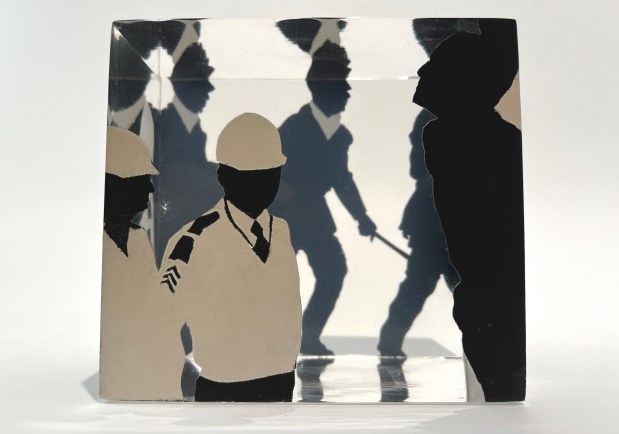
Speaking of ad men …
Remember the free-falling silhouette in the opening sequence of “Mad Men”? Idelle Weber (1932–2020) did it first. No one captured corporate banality quite like this Chicago-born artist, one of several underrecognized women in the Pop art movement: Her figures are blacked out save for the starchy white of their shirts. In a harbinger of her later 180 into photorealism, Weber trained her distinctive eye on harrowing scenes from the 1968 DNC: a protestor being hauled away by cops, swarms of officers with billysticks and one of her signature suited men, perhaps a politician, nonchalantly observing the fray. The Art Institute acquired three Weber works in November — fitting, since Weber credited the museum as inspiring her to pursue art as a young girl growing up post-Depression. As of writing, just one is on display, the four-paneled “Convention Fury” (1968). In the same gallery is the recently departed Claes Oldenburg’s “Feasible Monument to be Scattered in a City Park: Fragments of Nightstick Contact” (1969), the sculptor’s artistic response to being brutalized by police during the ’68 convention.
The Art Institute of Chicago, Gallery 289 (Modern Wing), 159 E. Monroe St., open Fridays-Mondays 11 a.m. to 5 p.m., 11 a.m. to 8 p.m. Thursdays, closed Tuesdays and Wednesdays; $26-$32 general admission, $14-$20 Chicago residents, $21-$27 Illinois residents; more information at www.artic.edu
— Hannah Edgar, freelance critic
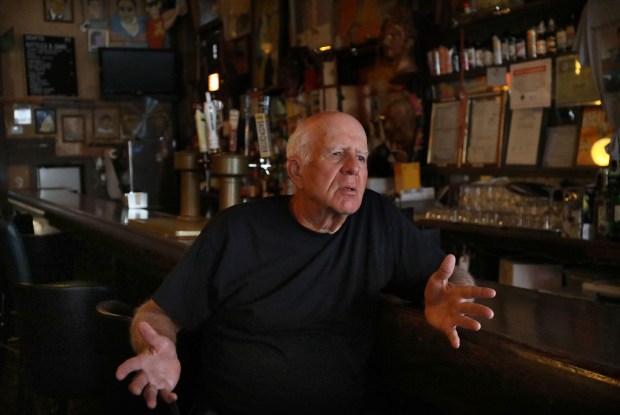
Where politicians bare all
Most conventioneers have been known to have a drink, and one of the best places to do that is at the venerable Old Town Ale House. The late movie critic Roger Ebert called it “the best bar in the world that I know about,” and it was a favorite of Anthony Bourdain. It’s filled with the artwork of Bruce Elliott, who has been part of the place for decades and has written about it (and his own raucous life) in a series of books. This spot has long been a favorite of many soon-to-be-stars and others from The Second City, which sits across the street. The place is unpretentious, lively and, if you are looking for a political connection (or an excuse to visit), know that Elliott’s portrait of a nude Sarah Palin became an international sensation when she was Republican vice presidential nominee in 2008. You’ll find others immortalized by Elliott on the walls, including — with adult themes — Marjorie Taylor Green; Stormy Daniels with Donald Trump; Melania and Ivanka together; and a new Supreme Court Justice.
219 W. North Ave., open 3 p.m. to 4 a.m. Sundays-Fridays and 3 p.m. to 5 p.m. Sundays.
— Rick Kogan, Tribune columnist
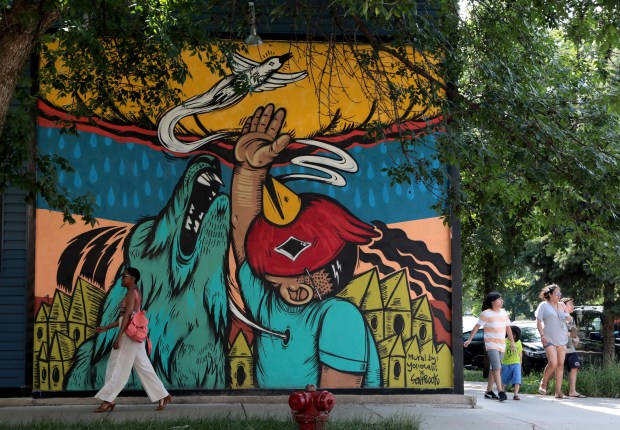
Portraits of a neighborhood
If you know, you know. But say you’re visiting for the DNC, or don’t get around this sprawling city enough, and you don’t know: A mural tour of Pilsen is a great couple of hours. Come for the ambitious scale of these works and stay for immigration history, sociopolitical background, the way religious and activist organizing led to indelible images. From the ubiquitous pop of Hebru Brantley to history painted by Salvadoran militants, the scope alone is dizzying. One way to start is with the National Museum of Mexican Art’s free guide, which includes Hector Duarte’s epic house-length “Gulliver in Wonderland” on Wolcott and Cullerton. For a bit more context, the Chicago Architecture Center offers a Pilsen walking tour on Tuesday morning, Aug. 20, that promises to delve deeper. And then there’s Pilsen Public Art Tours by artist Luis Tubens, who does private tours (for no fewer than two people and no more than 35). He’s been doing this for 20 years, he’s studied mural making and, being a Pilsen local himself, he’s got stories.
“Walk Pilsen,” hosted by the Chicago Architecture Center, 10 a.m. Aug. 20; tickets $30; more info at architecture.org
Pilsen Public Art Tours, location varies; $25 per adult for a 75-minute tour or $150 flat rate for schools and nonprofits; more info at ppat.space
The National Museum of Mexican Art (1852 W. 18th St.) offers a free online map of several murals at nationalmuseumofmexicanart.org
— Christopher Borrelli, Tribune features writer
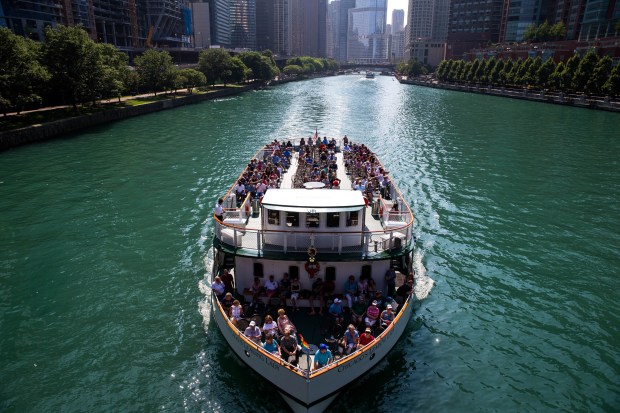
By foot or boat
“Walk Pilsen” isn’t the only offering by the Chicago Architecture Center during the DNC — far from it. All week, the organization ups its usual slate of walking tours to accommodate the influx of convention visitors. Those include an overview of Michigan and State’s most iconic buildings (Aug. 19), a guide to Civil War figures buried at Rosehill Cemetery (Aug. 20), tours of Millennium Park and Motor Row (Aug. 21), a specially commissioned bus tour of the Frank Lloyd Wright Historic District in Oak Park (Aug. 21), and an introduction to Chicago’s Chinatown (Aug. 22). Available every day? The center’s famous architecture boat tour, the most popular of its kind in the city.
Hours, registration and more information at architecture.org/tours
— Hannah Edgar, freelance critic
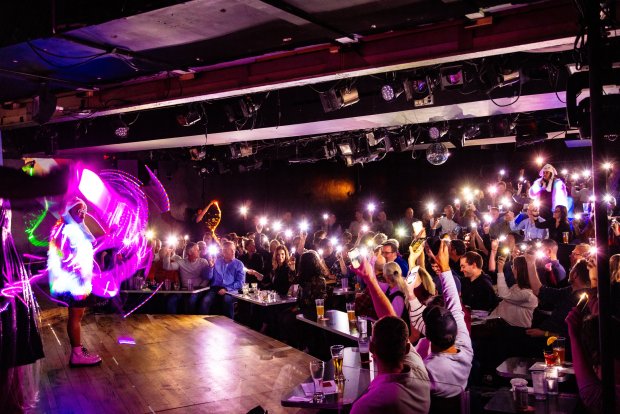
Laughs with a point
The Second City is one of Chicago’s most important entertainment institutions. Our city’s funny factory has been spoofing politicians for more than 60 years and offers a pair of comedy revues during the DNC. The e.t.c. Theater’s goofy and lovable “Oh, the Places You’ll Glow!” is my favorite of the two and has been adding new material in recent weeks in preparation for the election season. In the main theater, you’ll find the lively 112th mainstage attraction, the aptly named “The Devil is in the Detours,” a notably physical and robust sketch comedy show highlighting the talents of Adisa Williams, a star in the making.
“Oh, the Places You’ll Glow!” is in an open run in the e.t.c. Theater in Piper’s Alley, 230 W. North Ave.; tickets $39-$59; “The Devil is in the Detours” is in an open run in the Second City Mainstage, 1608 N. Wells St.; tickets $47-$101, both at 312-337-3992 and secondcity.com
— Chris Jones, Tribune theater critic
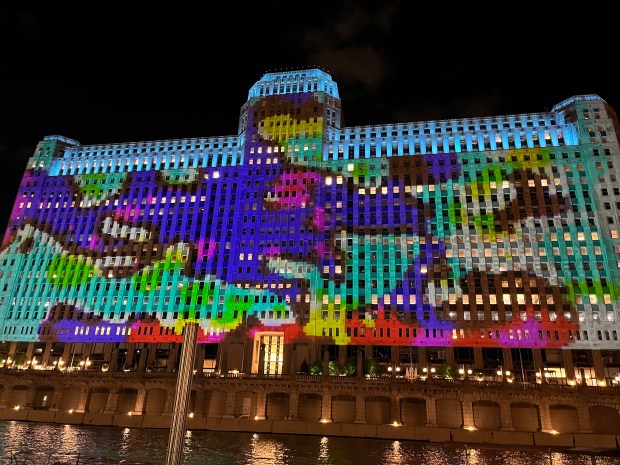
The price is right
If you’re in town for the convention or are hosting someone who is, don’t overlook the popular and totally free. The week of the DNC, Navy Pier hosts a house music exhibit and summer fireworks, launched from the Pier every Wednesday and Saturday through the end of the month. If you plan to extend your stay, the LatiNxt music festival begins at 2 p.m. on Aug. 24 and 25.
The Chicago Riverwalk is another cost-free destination, with Art on the Mart projected nightly 9 p.m. to 9:30 p.m. on the south facade of the building Chicagoans know as Merchandise Mart and currently featuring video artists Cory Arcangel and Yinka Ilori. If not the Riverwalk, head to Upper Wacker Drive at Wells Street for best viewing. (More at artonthemart.com)
Last but not least, Tuesday is the final night of the 2024 Millennium Park Summer Film Series. Indulge in a little hometown pride with “Ferris Bueller’s Day Off.”
“Ferris Bueller’s Day Off,” 6:30 p.m. Aug. 20 at Jay Pritzker Pavilion, 201 E. Randolph St.; more at chicago.gov
LatiNxt, 2 p.m. to 11 p.m. Aug. 24 and 2 p.m. to 8 p.m. Aug. 25 at Navy Pier, 600 E. Grand Ave.; more at navypier.org
“Chicago: Home of House Exhibit,” open daily 11 a.m. to 8 p.m. through Oct. 31 near Kilwin’s at Navy Pier, 600 E. Grand Ave.; more at navypier.org
Summer fireworks, 9 p.m. Wednesdays and 10 p.m. Saturdays through Aug. 31 at Navy Pier, 600 E. Grand Ave.; more at navypier.org
— Doug George, A+E editor
How to watch the DNC main event
The public is unable to attend events at the United Center but expect loads of coverage. According to a recent announcement from the Democratic National Convention Committee, primetime programming will be 5:30 p.m. to 10 p.m. on Aug. 19, then 6 p.m. to 10 p.m. on Aug. 20-22. Look for coverage on the major TV news networks plus an official livestream will be available at DemConvention.com, available with English and Spanish language audio as well as ASL interpretation. The DNCC also plans to host streams across a number of social media and online platforms:


